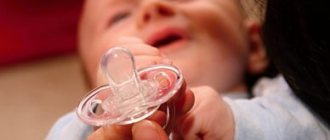The long-awaited meeting between mother and baby took place, everything seemed to go as it should. But why is the baby crying? It’s not always clear to a new mother. Only after some time will the mother be able to understand her baby by intonation, duration of crying and other criteria. Already in the second week, you can notice that in each situation the newborn cries differently.
Very important Reasons Miracle cries a lot, hiccups Newborn Baby suffers from hiccups
There are many reasons for crying. Here are just the most basic of them, which do not relate to problems with the baby’s health:
- hungry;
- wet diapers, diaper, clothes;
- inconveniently positioned, clothes or seams are tight;
- cold or hot;
- there are diaper rashes on the skin;
- tired, wants to sleep;
- wants to chat;
- scary when peeing or pooping - an incomprehensible process;
- they put him to bed, but he doesn’t want to sleep;
- just to attract attention.
It is very important to determine the cause of crying
The following table will clearly show why a newborn baby cries and how a mother or nanny can help him. Here are the most common causes and their main symptoms.
| Reason for crying | Symptoms | Help |
| Baby is hungry | Such crying is accompanied by a prolonged cry, and the child may blush and usually pulls his hands towards his mother. | Feed, caress |
| Wet diaper or diaper | The baby whines, now stronger, now weaker, the whimpering is continuous. Hiccups may occur | Change the diaper, change into dry clothes, warm your arms |
| Uncomfortable position | Such crying begins with a whimper, then the child begins to scream, wave his arms and legs, trying to shift into a more comfortable position. | If the baby is in a swaddle, re-swaddle. First you can try to simply change his position |
| The baby is hot | The child whines, the skin may turn slightly red, and a rash may appear. The baby is trying to free himself from diapers or clothes | Remove one layer of clothing, remove the cap, and in hot weather wipe with a wet diaper |
| The child is cold | In this case, the newborn cries piercingly with gradual calming, and hiccups may appear at the end. Another sign is that the skin of the abdomen, chest or back is cool. | Dress warmly, cover with a blanket |
| The newborn cries a lot during feeding (otitis media, inflammation of the oral mucosa, stuffy nose) | He swallows the nipple greedily, immediately begins to cry sharply, throws his head back | For all three reasons, a doctor is called. And nasal congestion is removed with the help of a “pear”, then you can continue feeding. |
| Newborn cries a lot after feeding | Bends his legs to his tummy, frowns, frowns, and screams pitifully | First, you need to check whether the baby is attached to the breast correctly. Does it cover the entire nipple areola or just the nipple? When he eats, no loud smacking should be heard. Secondly, after each feeding you need to carry it in a column for 15-20 minutes. |
| Newborn crying from intestinal colic | Accompanied by a very high-pitched scream with intervals of 5-20 minutes. | The baby's tummy needs to be warmed by holding it to your stomach or placing it on a heating pad. You can fold it several times, iron the baby diaper and also apply it to the baby’s tummy. After feeding, the baby is given dill water or special children's medications to drink, which can be bought at the pharmacy. |
| Diaper rash on the skin | Redness, sores, peeling in the groin area or butt | Treat with special means (oil, powder, cream). Change diapers or diapers more often |
| Newborn cries before going to pee | He calms down a little, as if listening, and immediately begins to cry. | Call a doctor |
| When to poop | The process of defecation is accompanied by severe redness of the face along with loud crying | Give water during the day if the child is mixed or bottle-fed. You can help cope with constipation by irritating the child's anus with the sharp tip of a thermometer lubricated with sunflower oil. You can enter a maximum of 1 cm! |
| Baby is just tired | It sounds less like crying and more like whimpering. | Rock, put to sleep |
| Teeth cutting | My mouth is watering. Bites fingers, refuses to breastfeed, loss of appetite, disturbed sleep | Gently massage your gums, let them chew a cold teether, and lubricate them with special ointments for gums. |
| Wants to chat | Then the newborn does not cry constantly, but as soon as the mother disappears from sight, he immediately calms down when she appears | Take me in my arms and sing a song |
| Doesn't want to sleep | Cranky, gets out of the diaper | Unwaddle and let him walk for a while |
| Easily excitable nervous system | Crying for no reason | Remove loud sounds, bright objects, and walk outside more often. Contact a neurologist |
Why does a newborn cry after breastfeeding?
Colic is one of the reasons for crying
The most common reason why a baby cries after feeding is colic. They represent pain in the intestines caused by increased gas formation. The main sign of colic is a sharp, high-pitched cry from the baby. At the same time, the newborn begins to blush, arch over, twist his legs, clench his hands into fists, close his eyes and hold his breath.
Colic usually appears in the afternoon, towards evening. Their average duration is 3 hours. At other times, the baby feels well, he gains weight and has a good appetite.
The nature of the appearance of colic has not been precisely studied by doctors. Painful sensations in children appear unexpectedly and disappear abruptly. Many children suffer from colic from the month of life until they reach 3 or even 6 months. Some babies do not develop colic.
How to get rid of colic in a baby
There are no universal remedies for getting rid of infant colic. But there are several ways to alleviate the child’s condition:
- Shifting or carrying the baby in your arms, tummy down. This pose helps eliminate excess gases.
- Massage the tummy clockwise.
- A heating pad or warm diaper on the tummy.
Dill water helps many children with colic. Nursing mothers are recommended to drink fennel teas.
Among the medications, drugs based on simethicone help - Espumisan, Infacol, Kolikid, Bobotik, Sab simplex. They must be taken with caution. Although they are approved for small children, they contain flavorings and can cause an allergic reaction.
As a last resort, you can use a gas tube or an enema. The main thing is not to harm the baby: the gas outlet tube can injure the anus, and the enema washes out the natural microflora, which can lead to intestinal dysbiosis and the inability to defecate on its own.
Swallowing air during feeding leads to bloating
Swallowing air during feeding can lead to colic. This happens if the baby is not applied to the breast correctly. When feeding, the baby should not be distracted by extraneous things. At this time, it is better to turn off the TV and remove bright objects away. In order for air to escape from the stomach, you need to hold it in an upright position for 15 minutes after feeding.
Increased gas formation can be caused by foods high in sugar that a nursing woman eats. She should go on a diet.
Lactase deficiency is one of the reasons
The cause of colic can be lactase deficiency. The breast milk that the baby receives at the beginning of feeding is called “foremilk.” It is rich in lactose (milk sugar). After about 10 minutes, the so-called “hind” milk begins to be produced, rich in fats that neutralize lactose and reduce gas formation. If a newborn receives only foremilk, then he or she develops an excess of lactose and a lack of lactase, which leads to bloating and flatulence.
Feeling hungry as a reason for crying
Sometimes crying causes a feeling of hunger if the mother does not have enough milk due to problems with lactation. To check whether the baby is getting enough food, you need to weigh him before and after feeding. The result obtained is checked against the food consumption standards of children of the corresponding age. You can also determine malnutrition by the number of wet diapers (there should be at least 6 of them per day). If the newborn really does not get enough to eat, you need to supplement him with formula.
Too much milk pressure can cause fear for the newborn. If he doesn't have time to swallow, he gags, squirms, screams and refuses the breast. In this case, it is worth reassuring the child, perhaps expressing excess milk and continuing feeding.
The child cries after feeding with formula. Air accumulation
Very often, a child cries after feeding with formula or breastfeeding if he swallows air along with the milk. This process contributes to the accumulation of air in the stomach and causes pain. To relieve the baby from pain, it is enough to hold the baby in an upright position, or, as they also say, “in a column” after each feeding. If the air is not fully released, continue to hold the baby upright, but find a position that puts light pressure on the baby's tummy. This will help the air escape quickly and relieve the child from pain.
Why does a newborn cry after formula feeding?
In addition to colic, which, according to statistics, occurs more often in bottle-fed babies than in breastfed babies, the cause of crying after eating can be banal overeating.
Read in this article:
Very often newborn babies cry. This can be caused by various reasons. A baby's cry should be regarded as a call for help, because infants cannot signal or attract attention in other ways.
The baby cannot express its needs, painful sensations or feelings of hunger with anything other than crying. It is extremely important to respond urgently to the urges of a newborn baby, but it is equally important to understand what exactly he wants. As a rule, babies have many reasons for crying, which are difficult for an inexperienced mother to understand. New parents are most often lost in such situations, not realizing that they need to be smart.
The child cries after feeding with formula. Undernourished or overeaten
When feeding with formula, it is much easier for the mother to control the portion that the baby eats, which cannot be said about breastfeeding. Often a child cries after feeding with formula, or even more so with breastfeeding if he has not received the required volume of milk. Solving this problem is not difficult. When breastfeeding, it is enough to supplement the baby with the other breast. If artificial, increase the volume of the mixture. However, before giving the “artificial” food more than the prescribed norm, it is recommended to consult with a pediatrician, as there is a risk of overeating, and, as a result, a feeling of heaviness in the baby’s stomach and subsequent crying.
The main causes of crying in an infant
Any young mother begins to understand the reason for the baby's crying at some point, but for this she needs to adapt to her new role. To cope with this task much faster, you need to familiarize yourself with the basic needs of an infant, which are given below.
Why does a newborn cry while feeding?
If a baby cries during feeding, it is most often due to inflammation of the inside of the mouth or middle ear. The second option is often accompanied by noisy hysteria, because any food has difficulty passing through the baby’s throat due to the acute pain that arises. This situation can be easily determined, since even a hungry baby immediately tears away from the nipple (bottle) and begins to cry shrilly. With diseases associated with the middle ear, the child often screams in his sleep, so crying may not always overlap with the feeding period.
It must be taken into account that a child does not always cry because of a certain illness. It is worth paying attention to whether the baby’s nose is blocked, as he should breathe freely.
Why does a baby cry after feeding?
Sometimes after feeding, newborn babies twitch their legs, roll over, frown slightly and scream intermittently. This is usually due to the fact that during feeding, excess air enters the baby’s stomach, which causes discomfort and unpleasant sensations. This problem is due to the fact that many mothers do not know how to feed their children properly due to lack of necessary experience. You should always make sure that the baby attaches well to the breast and does not smack his lips. After feeding, you will need to carry the baby in your arms in an upright position for half an hour so that the milk is well absorbed.
Why does a baby cry before going to sleep?
It is worth considering that a child is, first of all, a small person who gets tired by the end of the day. In this case, the baby begins to whine and attract attention. Before going to bed, his interest in the environment wanes. But an infant cannot always fall asleep on his own, so it is necessary to help him with this.
If your baby constantly cries before going to bed, you should develop the habit of soothing him to sleep by following a certain routine. Try to dim the lights and create a calm environment around. Then take him in your arms, walk around the room, caress him and sing a lullaby. Before going to bed, short walks or a soak in a full bath can be helpful. The main thing is to remember that you will need to avoid any noisy places.
Babies don't always want to sleep, so too much force can also cause hysterics. In this situation, it is necessary to free the baby from the diapers so that he feels free and can crawl for his own pleasure.
If your baby whines in his sleep, you will need to be nearby at all times because he needs to sense his mother's presence. Crying in a dream can be caused by overexcitement from an emotionally intense day. In addition, the cry is often associated with teething or colic in the stomach. During this period, the mother should hold the baby closer to her so that he feels her support.
Why does a baby cry and squirm after formula feeding: the main reasons and how to deal with it
Every woman who has given birth to a child is in a constant state of worry about his health, especially in the first months after childbirth. This article is devoted to the problem of baby crying, which is associated with the process of feeding the baby with artificial milk formula.
What makes a baby cry after formula feeding?
Crying is the only way a baby communicates with the outside world. Therefore, it is very important to correctly understand what a baby’s cry signals at one time or another. The causes of discomfort can be divided into 3 groups:
- Physical inconveniences , which are caused by uncomfortable temperature (overheating, hypothermia), bright light, sharp and loud sounds, and a dirty diaper.
- Physiological causes - thrush, otitis media, colic, etc.
- Psychological factors - insufficient attention of the mother, the need for longer and closer contact, etc.
Crying from colic
This is the most common cause of crying in children in the first months of life. Colic occurs when gas accumulates in the intestines, causing pain and discomfort. Symptoms of colic appear between birth and 6 weeks of life and peak when the baby is 2 months old.
Important! Colic pain lasts approximately 3 hours and most often occurs after evening feeding.
In most cases, colic goes away on its own when the baby reaches 3 months, although in 10% of infants, painful manifestations can continue until 5 months of age.
From the accumulation of air in the stomach
If the baby swallows air while feeding formula from a bottle, he will cry after eating. Crying in this case is caused by severe discomfort due to the fact that an air bubble has formed in the stomach.
From hunger
The baby may cry after feeding when the bottle with the formula is already empty - he probably did not receive the full amount of food. In this case, the baby will reach for the bottle for more.
From overeating
There is a misconception that a child will not eat more food than he needs. However, the problem of overeating is more often faced by those mothers whose children are bottle-fed.
As a result of excessive consumption of formula, a feeling of heaviness in the stomach occurs, due to which the child becomes restless and whiny.
Pediatricians recommend strictly following nutritional standards according to the baby’s age and adhering to a feeding regimen.
Because of illness
If a child has otitis media (inflammation of the middle ear) or thrush in the mouth, then pain and discomfort will worsen after feeding, manifesting itself in screaming, especially after the mother tries to touch the ear.
How to determine what is causing crying
In the first months after birth, the child adapts to life outside the mother’s womb - he gets used to the sleep and wakefulness patterns, feeding, digestion, etc. This is new and unusual for a newborn, so he constantly cries.
In the first weeks after childbirth, a woman also gets used to her new state of motherhood, observes the baby and gradually begins to understand the reasons for the child’s screaming and crying.
As mentioned above, this may be a condition not related to illness (discomfort, temperature change, hunger, etc.).
If you suspect an earache, headache or other painful conditions that cause the baby to cry, you should immediately consult a doctor and not try to treat the baby yourself.
For example, in case of hunger, the baby smacks his mouth, as if searching for a source of food. When hypothermia occurs, the child shrinks into a ball, hiding his limbs under the body, and in case of heat, he becomes sweaty and red and tries to get rid of clothes.
The pain experienced by a newborn can be judged by an even, unabating cry with screams - it signals colic, teething, skin irritation, headaches and other pains.
It is necessary to constantly monitor the baby’s behavior, gradually correlating the intensity and tone of crying with the general physical condition of the child at the time of his restlessness.
How to calm a child correctly
Whatever the reason for crying, you must try to calm the baby as quickly as possible.
To do this, you can use various methods:
- In case of colic, perform a light massage of the abdomen, and then apply a diaper heated with an iron, folded in several layers.
- For some time after feeding, carry the newborn in an upright position, in a column. This will allow the air that was absorbed by the baby while sucking the bottle to escape.
- If the air bubble presses on the walls of the stomach, the child should be placed on the adult's shoulder so that the baby's arms and head are behind the shoulder. Within a short period of time, excess air will go away and the pain will stop.
- If the baby is crying “hungry”, you need to supplement the baby with formula.
Prevention of colic
As already mentioned, in order to relieve a baby from colic, you need to not put him in the crib immediately after feeding, but hold him in the “soldier” position for some time.
Other preventive measures against colic include the following:
- carefully choose infant formula;
- observe diet and hygiene when feeding the baby;
- make sure that no air gets into the bottle with the formula;
- carefully approach the mother’s nutrition (in the case of breastfeeding);
- from time to time, lay the baby on his stomach for 10 minutes and stroke his back;
- on the recommendation of a pediatrician, you can use pharmaceutical herbal preparations based on anise, dill, and fennel.
A child’s crying is a natural mechanism that allows a baby to “declare” its problems to adults. Therefore, it is very important to be able to recognize his needs in the intonations of a child’s cry and promptly eliminate possible sources of crying.
Source: //agu.life/bok/2185-pochemu-novorozhdennyy-plachet-posle-kormleniya-smesyu.html
Other causes of newborn crying
The basic need of any infant is to satisfy hunger.
In this case, crying is almost always accompanied by a protracted ringing cry. The baby blushes and stretches its arms in your direction, expressing its need for milk. He must be fed regardless of whether the right time has come. A newborn may ask for food even while sleeping, so you always need to be prepared.
Babies often cry if they experience some discomfort after urinating in the diaper. A wet diaper can cause skin irritation, so you should always keep it dry.
When diapers are wet, crying may be accompanied by hiccups. In this case, you will need to change the diaper and cover the baby warmly so that he calms down faster. If your baby spends the whole night in one diaper, discomfort may be caused by an increase in its volume. Therefore, sometimes it will have to be changed, even if it is not yet wet.
The baby often whines because his clothes are restrictive. At the same time, he begins to twitch and fidget in different directions in order to turn over and change his position.
It happens that infants cry because of their temperature, which usually rises if they are not unswaddled in time. Screams are often accompanied by fidgeting, as well as redness of the skin. Sometimes there is even a red rash caused by sweat.
If the body temperature, on the contrary, is low, the baby begins to cry loudly, after which it simply lies and whimpers, twitching its arms and legs. In this situation, you will need to provide comfort to the baby by wrapping him in a warm blanket. Children usually feel cold if their torso is below normal temperature.
Don't rush to wrap your newborn if he has cold hands, feet or nose. This is caused by imperfections in the autonomic system of infants. In this case, you need to put socks on the baby’s feet or warm them by dipping them in a bowl of warm water.
Babies are often susceptible to colic in the stomach, which is accompanied by loud crying with temporary interruptions. It so happens that boys experience colic much more often than girls. Features if they are the firstborn.
Why does colic occur and what is it usually associated with? This disease has several sources. For example, a mother’s metabolism is disrupted while breastfeeding. Another reason may be the infant’s poorly developed enzymatic system, which contributes to the accumulation of gases inside the intestines. As a result, they put pressure on the intestinal lining, which causes discomfort accompanied by painful spasms.
In order to prevent the occurrence of colic, you need to take the baby in your arms and try to warm him up. In this case, you need to pay special attention to warming the abdomen, it is advisable to apply a warm heating pad to it. You can also use a gas tube, which often helps.
If none of this helps, you will need to consult your personal pediatrician. Doctors usually prescribe activated charcoal or espumisan. These products are designed to act directly on gas deposits. Subsequently, they dissolve and are excreted from the intestines. Dill water is also a proven folk remedy.
Sometimes babies cry due to diaper rash and irritation caused by wet diapers. The baby's skin stops breathing, dries and tightens. Therefore, it is necessary to provide timely care to prevent irritation.
Crying during bowel movements
If your baby constantly cries when defecating, you need to monitor his genital hygiene. It is necessary to regularly wash the baby's bottom. Sometimes crying is associated with possible constipation in the intestines or an ineptly used gas outlet tube. In the second case, the anal mucosa may be affected. If the crying does not stop, you should contact your pediatrician. Screaming may also be associated with inflammation of the bladder, which is often accompanied by fever. In this situation, the child will need emergency assistance from a qualified specialist.
Newborn baby teething
This process is different for all babies, but most often it is painless. However, some children experience discomfort when they are teething. In order to determine the child’s well-being, you will need to closely monitor the baby. When experiencing pain, children often bite their fingers or improvised objects, and sometimes their gums turn red. The baby may refuse to feed, and his usual sleep patterns are disrupted.
You will help your child if you try to gently massage the gums with your finger. In this case, it is necessary to observe the rules of hygiene.
Baby needs communication
Always remember that a small child is very sensitive and vulnerable. He always needs his mother's affection and wants to hear her voice. Usually the baby attracts attention with a piercing cry, but as soon as you caress and hug him, he will immediately begin to calm down.
Unreasonable crying indicates not only a possible illness, but also the internal sensations of the baby, which are often associated with the outside world. He needs more silence and maternal attention. Try to follow all precautions and take care of your baby!
From the moment of birth, a newborn baby begins a long and complex process of adaptation to the environment. If previously his body received nutrients from the mother’s body, now he will have to learn to consume food on his own.
In the practice of young mothers, situations often arise when the baby is capricious, cries and expresses dissatisfaction during and after feeding. This phenomenon occurs with equal frequency both among breastfed children and among babies who consume artificial milk formula.
Reasons for crying while breastfeeding
If the baby expresses dissatisfaction during and after breastfeeding, there are several reasons for this. The list of reasons includes the following factors:
- Cramps and pain in the abdomen. If, while breastfeeding, the baby looks restless, cries and twitches its legs, then these symptoms indicate the formation of intestinal tract, which is typical for newborns. The baby's digestive system is not able to produce enough enzymes, resulting in increased gas formation in the intestines (flatulence) and colic.
- Inflammatory diseases of the middle ear (otitis). This disease is very common among children in the first year of life. This tendency is due to the structural features of the infant's nasopharynx. Often otitis media occurs without fever or other signs. If the baby cries when feeding, then the young mother is advised to show the baby to a medical specialist. Sucking and swallowing movements cause aggravation of pain in the ears, so the baby becomes restless and capricious.
- Air entering the stomach during feeding. Failure to comply with breastfeeding techniques can cause air swallowing during feeding. The incoming air forms a plug, which causes discomfort and pain in the baby.
- Inflammatory diseases of the oral cavity and oropharynx. Breastfeeding can provoke increased pain if the baby has an inflammatory process in the oropharynx and oral cavity. Most likely, the baby has developed pharyngitis or candidiasis (thrush).
- Insufficient amount of mother's milk. The baby's crying and whims during and after feeding may indicate a deficiency of breast milk in the mother's mammary glands. In order to understand this problem, the young mother is recommended to carry out control weighing of the child before and after breastfeeding. The weight difference will correspond to the amount of milk consumed.
- Taste qualities of mother's milk. If a nursing woman makes mistakes in her diet, then the taste of her milk changes. Eating spices, garlic, onions and smoked meats affects the taste of milk. Such food causes the baby to refuse to feed.
- General malaise and headache. When a baby cries during and after feeding, the cause may be a headache caused by neurological disorders. In this case, the child should be examined by a pediatric neurologist and other specialists.
- . High blood pressure in breast milk causes the baby to complain and cry.
Each problem requires an individual approach to solving it.
Causes of crying during artificial feeding
Unfortunately, not every young mother can afford breastfeeding for a number of reasons. The child's dissatisfaction and crying during and after feeding with formula milk can be caused by the following factors:
- Undereating or overeating. A lack or excess of formula provokes whims and crying in a newborn baby. If the baby does not feed on mother's milk, then parents need to independently regulate the amount of food for the baby. After the birth of the baby, parents should consult a pediatrician who can calculate the individual food intake for the baby.
- Psychological factors. Feeding a baby with formula does not allow for close psychological contact to be established between mother and child. When a child feels internally insecure, he becomes capricious and cries both during feeding and after.
- The mixture is not suitable. Not every adapted milk formula is suitable for a baby. This is due to the fact that all children are individual. The child may not like the taste of the food. In addition, some mixtures cause digestive disorders, which leads to anxiety in the child. Read about which mixtures are suitable for infants in the article at the link.
- Intestinal colic. As with breastfeeding, artificial milk formulas can cause increased gas formation in the baby’s intestines. With this disease, the baby cries both during feeding and after.
- Inappropriate bottle and nipple. A large hole in the nipple speeds up the flow of formula from the bottle and causes air to enter the baby's stomach. The resulting air bubble causes a lot of discomfort in the child.
How to help
In order to provide the child with the necessary help, parents must be sure of the cause of discontent and whims. If crying is caused by intestinal colic, then you can help the baby with the help of special means that reduce gas formation in the intestines, as well as with the help of stroking and. To do this, you need to lay the child on his back and gently stroke his tummy clockwise. Next, you need to take both of the baby’s legs and perform the “bicycle” exercise, periodically pressing them to the tummy.
If the baby is bottle-fed, then parents need to choose a different milk formula that contains less protein.
If crying is caused by air getting into the stomach, then after feeding the mother should turn the baby into an upright position and carry her in her arms for 10-15 minutes. Stroking the back stimulates the passage of excess air.
In order to eliminate psychological factors during artificial feeding, it is enough to spend more time in close contact with the baby. The mother is recommended to hold the baby in her arms more often, cuddle her, put her to sleep next to her, and talk to the baby in a calm tone.
To prevent nutritional deficiencies and excesses, it is necessary to carefully monitor the amount of food consumed by the child. When breastfeeding, the baby is able to independently regulate the amount of milk. If artificial formulas are used, then parents themselves must prepare the age-appropriate amount of food. If in doubt, it is recommended to use the method of counting diapers or control weighing before and after feeding.
When a baby suffers from malnutrition due to decreased lactation, the young mother will need the help of a breastfeeding specialist. Breast milk production is stimulated by adjusting the diet, drinking regimen, massaging the mammary gland area, as well as taking medications that stimulate lactogenesis.
If the cause of anxiety and crying is neurological diseases and other health problems, then it is strictly forbidden to solve this problem on your own. Only a qualified specialist can provide the necessary assistance, who will conduct a detailed examination of the child and prescribe treatment.
A healthy and satisfied baby will never express dissatisfaction during or after feeding. If the baby is restless, crying and capricious, then parents need to make every effort to find and eliminate the cause. If this cannot be achieved on your own, it is recommended to seek help from specialists.
Don't
cry , don't cry , I 'll die . Don't cry , dear , I'll kill another one . Don't cry , don't scream , I'll give you three .
Every mother worries and worries when her child cries. And there is no such mother who, at least once, would not cry with her baby.
Little children are crying! You can't argue with this fact. But here's how babies cry, when, how often, and most importantly, why - let's figure it out.
A child who is not bothered by anything behaves calmly. And when we cry, the little man declares his needs. This is the only way the baby can tell his mother that something is bothering him. This is an innate mechanism for communicating with the world.
Stay calm! Try to find the cause of the crying and eliminate it. It can be difficult to understand at first, and even more difficult in a state of one’s own anxiety and uncertainty. Children often cry in response to their mother’s anxious state. It is important to follow the infant's nonverbal cues. Once you learn to recognize why your baby is crying, it will become much easier for you.
.
Regurgitation
Sometimes a baby cries after feeding with formula or breastfeeding, and also spits up profusely (we recommend reading:). Parents are frightened by such a “milk fountain”, primarily because the child does not receive enough nutrition. It is worth noting here that regurgitation is functional in nature and can be a variant of the norm. If the baby is gaining weight, has clear skin, and has normal stools, regurgitation most likely does not harm him. The baby will grow up, take a vertical position, his gastrointestinal tract will work better and regurgitation will stop.
Regurgitation in itself is not a pathology; it goes away with age
Why else does a baby spit up? This phenomenon may be the stomach’s response to overeating - it is difficult for the baby to stop at the moment of satiety. Another reason is improper functioning of the gastrointestinal tract, as well as a lack of enzymes. A gastroenterologist can determine the root of the problem and prescribe treatment based on stool tests (coprogram) and blood tests. In some cases, an ultrasound of the pancreas is required. If you are concerned about regurgitation, you should be very careful about introducing complementary foods - be sure to discuss it with your pediatrician.
How to help?
- If a child spits up due to overeating, you need to reduce the intervals between feedings. He will not have time to get very hungry and will eat less; his stomach will not get rid of the excess.
- It is important to monitor how the baby eats. The reason for regurgitation may be that he swallows air along with milk. If the mother is breastfeeding, it is necessary that not only the nipple, but also part of the areola gets into the baby’s mouth, and the baby’s lower lip is slightly turned outward.
- We must not forget to carry the baby upright after eating to give him the opportunity to burp air. It is allowed to stroke the baby on the back to help the air escape. Only after hearing the specific sound of a burp can you put the baby to bed. The same should be done if the baby receives complementary foods from a spoon.
Hunger
Many mothers consider hunger to be the most common reason for a baby crying after feeding. Indeed, this version should be considered one of the first. It is also the easiest to check.
If the baby gains weight well, and according to WHO standards, this is more than 500 grams per month during the first 3-4 months of life, or 125 grams per week, and the number of urinations per day is at least 12 times, then he has enough nutrition.
Assess the situation. If weight loss is not critical, you should not immediately introduce the mixture. Yes, many children, having received 100-120 ml of the mixture, calm down, stop crying and fall asleep for several hours. But not because they finally fell asleep full and satisfied. It’s simply because the baby’s stomach is filled with food that is difficult to digest, and the body spends all its energy on processing the mixture. It will digest it and may cry again, if the reason for the crying is not hunger.
The child cries after feeding with formula. Crying from intestinal colic
So, the signs of intestinal colic are the following: - the child screams shrilly, bordering on a squeal. Crying is accompanied by the release of gases; - the child’s hands are tightly clenched into fists, and the legs move erratically; - the child frowns and squints his eyes tightly; - the baby’s body is tense or curved in the shape of an arc; - often during colic there may be slight delays in breathing. Mostly, bouts of baby crying after formula or breastfeeding, which are caused by intestinal colic, can last up to three hours and are most often observed in the afternoon or evening. The causes of colic in children are not fully understood. However, if you or your pediatrician have determined that crying after feeding is associated with colic, you can help the child in the following way: - try to keep the child warm. A mother's hug or, at worst, a heating pad wrapped in a diaper will help; - give your baby a light circular abdominal massage; - carry the baby in a column; - place the baby on his stomach after feeding;
Cold-hot
If a child is cold, he cries, shrinks into a ball and requires the breast for heating - because during sucking, energy is expended and heat is released, which warms him.
It happens that the baby is warm at the chest, he has eaten and let go of the chest. Mommy puts him in his crib, and he immediately wakes up, worries about the loss of heat and cries. In this case, try feeding your baby swaddled so that his body retains heat longer. At the end of feeding, while continuing to hold the baby in your arms, cover him with a blanket or warm diaper and transfer him to the crib.
Watch the color of the skin; normally it is pale pink.
Red skin indicates that the child is hot. Breastfeeding itself makes the toddler sweat, and if he is wearing too many clothes, the room is hot - crying at the chest is inevitable. The baby is hot, and your body makes it even hotter, but at the same time, he wants to quench his thirst by sucking milk... Undress the poor thing immediately! And watch the temperature in the room, it should not exceed 20 degrees.
Prevention of colic
As already mentioned, in order to relieve a baby from colic, you need to not put him in the crib immediately after feeding, but hold him in the “soldier” position for some time.
Other preventive measures against colic include the following:
- carefully choose infant formula;
- observe diet and hygiene when feeding the baby;
- make sure that no air gets into the bottle with the formula;
- carefully approach the mother’s nutrition (in the case of breastfeeding);
- from time to time, lay the baby on his stomach for 10 minutes and stroke his back;
- on the recommendation of a pediatrician, you can use pharmaceutical herbal preparations based on anise, dill, and fennel.
Did you know? Babies smile on average up to 200 times a day. For comparison, women smile approximately 60 times and men 8 times during the same period.
A child’s crying is a natural mechanism that allows a baby to “declare” its problems to adults. Therefore, it is very important to be able to recognize his needs in the intonations of a child’s cry and promptly eliminate possible sources of crying.
Pain
Many children experience tummy pain and hiccups after feeding due to enzymatic immaturity of the digestive system. Intestinal colic cannot be confused with anything. After feeding, the baby screams, kicks his legs, presses them to his tummy, his face turns red, the crying becomes simply uncontrollable, it seems that he will never stop. Constant hiccups in newborns after feeding can also unsettle the balance, what should you do? Here you need to show maximum patience, calmness and ingenuity. Try everything until you find a way to stop the crying: tummy massage, warm swaddle on the tummy, rocking on a fitball, white noise, lullabies, different ways of carrying the baby (tummy down on your arm bent at the elbow). Something will definitely bring relief to the baby.
When feeding by the hour, supplementing with water, or improper breastfeeding, the baby may be bothered by flatulence
,
heartburn, hiccups
. In this case, contact a lactation consultant to effectively organize breastfeeding
But, unfortunately, it’s not just the baby’s tummy that can hurt.
With otitis -
the baby reaches for the breast, maybe even sucks, but lets go, cries, and looks for the breast again.
For candidiasis of the oral mucosa
The baby cries at the beginning of feeding, then still latches on and sucks, and cries again at the end of feeding. As a rule, a whitish coating can be seen on the oral mucosa and tongue.
If you suspect otitis and candidiasis, consult a doctor.
Discomfort
If you have ruled out the above reasons for crying, but the baby continues to cry, perhaps something is causing discomfort:
- diaper rash
- seam on clothes
- uncomfortable position when feeding
- wet/dirty diaper
- bright light
- the baby is overtired
Eliminating these causes is not difficult: wash the baby, change the diaper, straighten the seams on the clothes and the folds in the diaper, dim the lights, reduce unnecessary sounds, rock them, and attach them correctly to the chest.
Loneliness and lack of physical contact with mom
Above, we indicated that the need to satisfy hunger is one of the first reasons for a baby’s crying. However, the need for physical contact with mother in the first months of life often becomes the real reason for the toddler’s crying.
The baby does not yet recognize himself as separate from his mother. In his mind, his mother is a part of himself. Yes, I satisfied the sucking reflex and got full, but for some reason I lost part of myself...
And the poor baby cries, not understanding where the dear and necessary part is, and when it will unite with him again (read, take him in his arms).
At this time, “well-wishers” tell the mother: “You’re crying, you haven’t eaten enough, you don’t have enough milk, you need to give formula.” And breastfeeding fades away. And most importantly, the child, having not received the right actions from his mother, over time simply stops turning to her (read, stops crying). The saddest scenario...
Be a confident mother, listen to your child and respond correctly to crying.
Statistics say that children who are carried in a sling cry less.
And psychology and the history of mankind prove that a child under one year old does not manipulate his crying, but shouts about his needs. It is impossible to spoil him by satisfying them.
Important!
If:
- all measures taken to calm the baby’s crying do not help
- The baby shows signs of illness on his face
- the baby cries for more than 3 hours without a break and refuses to breastfeed
You need to seek help from a doctor.
What were the reasons for your child’s crying? How quickly did you learn to identify them?
For a newborn, crying is the only available way of communicating with the outside world in the first months of life. There are several reasons why a baby cries when feeding:
A newborn baby cries during feeding: many parents face this problem, and the main task is to determine the cause of such crying in order to eliminate it. When the child cries, he says that he feels bad and needs adult help.
Lactase deficiency
The cause of crying may be a serious illness - lactase deficiency. The enzyme that breaks down lactose (milk sugar) must be generated in sufficient quantities by the small intestine. If this enzyme (lactase) is deficient or absent, breast milk or formula containing lactose will not be digested by the baby, but will only cause digestive problems. Symptoms of lactase deficiency other than crying are:
- Stool upset - it can happen up to 10 times a day, have a foamy texture and a sour smell (we recommend reading:). At the same time, irregular stool, as well as its complete absence without stimulation, can indicate lactase deficiency.
- Bloating.
- The child is underweight.
Lactase deficiency may occur during the period of introducing complementary foods if the mother begins to add cow's milk to the porridge. However, only a doctor can give a definite answer to the question of whether the baby has this problem based on research. If the result is positive, you will have to feed the baby with a special lactose-free mixture.
We have described several reasons for a baby's anxiety after feeding. Sometimes his cries are sporadic and go away on their own without outside intervention. However, there are also atypical cases, the causes of which a good doctor will help to identify. Do not neglect regular examinations - by observing a small patient over time, the doctor will be able to make the most accurate diagnosis.
Don't
cry , don't cry , I 'll die . Don't cry , dear , I'll kill another one . Don't cry , don't scream , I'll give you three .
Every mother worries and worries when her child cries. And there is no such mother who, at least once, would not cry with her baby.
Little children are crying! You can't argue with this fact. But here's how babies cry, when, how often, and most importantly, why - let's figure it out.
A child who is not bothered by anything behaves calmly. And when we cry, the little man declares his needs. This is the only way the baby can tell his mother that something is bothering him. This is an innate mechanism for communicating with the world.
Stay calm! Try to find the cause of the crying and eliminate it. It can be difficult to understand at first, and even more difficult in a state of one’s own anxiety and uncertainty. Children often cry in response to their mother’s anxious state. It is important to follow the infant's nonverbal cues. Once you learn to recognize why your baby is crying, it will become much easier for you.
.
Why does a baby cry when feeding?
Let's try to take a closer look at why a baby cries during feeding:
- I have a stomachache. Infantile colic is a common phenomenon caused by the immaturity of the intestinal microflora and enzymatic system. The food in the baby's stomach is not digested enough, and during the fermentation of the remains of undigested food, gases are formed, bloating occurs, and the baby is bothered by colic, which makes the baby cry when feeding. In this case, the child accompanies crying with characteristic movements - he arches, pulls his knees to his stomach, twists his legs;
- An air bubble has formed in the stomach - when sucking, the baby takes in air with milk, the stomach swells excessively, bothers the baby, and he cries when feeding. You should hold it vertically a little, and the air will come out after a short time. The main reason for a baby swallowing air during feeding may be improper latching of the nipple or pacifier during sucking;
- Sore ears - the nasopharynx of babies in the first year of life is just developing, which is the cause of frequent otitis media, which in most cases is asymptomatic. But sudden swallowing movements during otitis media can cause acute pain in the ears. To check, just lightly press the tragus on the baby’s ears; if the child reacts with sudden, strong crying, you should urgently consult a doctor;
- Inflammatory processes of the oral mucosa - pain in the throat or mouth can be caused by thrush, stomatitis or pharyngitis;
- Unpleasant taste of milk - the baby may not like the taste of mother's milk. This is due to the mother’s diet if she has consumed spicy foods, garlic or onions; the baby can take the breast, drop it and reach again, and at the same time he cries loudly and resentfully when feeding;
- Lack of milk - a feeling of hunger with insufficient saturation during sucking may be the reason why the baby cries when feeding;
- Very rapid release of milk - when there is a lot of breast milk, it is difficult for the baby to have time to swallow it, so he begins to choke and cry;
- Fatigue. The process of feeding a baby is quite hard work, and his nervous system is hyperexcitable. If he gets tired during the sucking process, he reports this by crying. It is necessary to let the baby rest and then continue feeding;
- Headache – There are a number of neurological disorders in newborns that cause headaches when the child makes swallowing movements. If every feeding of the baby is accompanied by loud crying for no apparent reason, you should consult a neurologist.
Colic
An infant often suffers from bloating, which is manifested by acute pain. At the same time, he wriggles, strains, screams sharply and loudly. Such pain most often occurs in children who are already 2 weeks old, but they disappear by three months. Discomfort in the abdominal area can occur not only after eating, but also between feedings. Sometimes mothers think that the baby is not full, so they offer him to eat an additional portion. By these actions they only aggravate the situation and disrupt the baby’s diet.
What to do?
First of all, you should make sure that the crying is associated with colic in the tummy. This can be indicated by a sharp, demanding cry, pulling the legs towards the chest, or a swollen tummy. You can help your child in different ways:
- Give the baby drugs that reduce gas formation - Infacol, Bobotik. Home methods for combating intestinal colic are no less effective. Fennel decoction helps. All this can be bought at a pharmacy or children's store.
- Dry heat works wonders - just iron the diaper with a hot iron and place it on your tummy.
- Mom's warmth helps. You need to take the baby in your arms so that his tummy is pressed against his mother’s, and hold for 5-10 minutes. Sometimes a vertical position helps get rid of colic, sometimes a horizontal position.
The warmth of the mother's tummy will help get rid of colic.
If the baby has had intestinal colic, complementary foods should be introduced carefully. It is important to avoid foods that cause gas - cabbage, peas, legumes.
Prevention
If a baby suffers from bloating and colic, it is necessary not only to deal with pain, but also to carry out prevention. It is recommended to place him on his tummy 5-15 minutes before feeding. In this way, digestion is activated, and the child’s gastrointestinal tract prepares for eating. Some pediatricians note that special exercises also stimulate the gastrointestinal tract. You need to spread the baby’s arms apart and bring them together, and also bend your knees and straighten them again.










